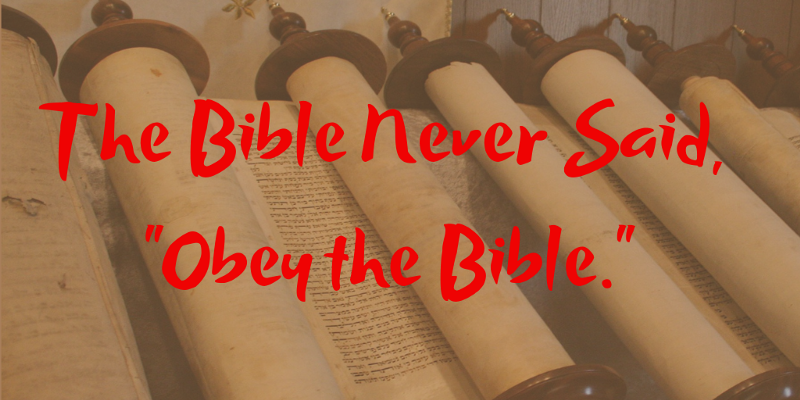Back when I was one of approximately four people going to heaven, I used to knock on doors to let others know. I didn’t really care that much if they accepted what I had to say; I just knew that in addition to conforming to every “command, example, and necessary inference”¹ in the Bible, I also had to warn others of their impending doom.
There was just one problem with doing all of that – it wasn’t possible.
I was newly married, had a part time job in the eeaarly mornings, was a full-time student, and spent at least two hours every day knocking doors. All of that was in addition to attending church services three plus times per week. After eighteen months at that pace, I played out. I reached a place where even the fear of hell wasn’t enough to get me off the couch.
I still remember when Uriah called. I took the cordless phone (this was the early nineties) out to the carport, rested my elbow on the washing machine and my ear on the receiver.
“Hey,” he said, “I was reading in Colossians and I got to 1:27 that says, ‘the mystery hidden for the ages is Christ in you.’ That’s it! That’s what it’s all about.”
“Man, I just don’t have the energy to think about that right now,” was my reply.
He responded, “This doesn’t take energy; it gives it! There’s something different about me now, I mean, I can’t drive by someone on the side of the road without stopping to help them.”
“That sounds great,” I dismissed. “Can we talk about this later?”
In a few days, my guilt compounded enough to pry me from the couch and into the seat of Uriah’s 1970-something Mercury Monarch. I still remember sitting in front of Applegate Apartments, paralyzed by dread.
“Man, I don’t think I can do this today,” I confided to my compatriot.
“I’m telling you, the answer is, ‘Christ in you,’” he responded.
I didn’t know what that meant, but there, trapped between hell on earth and hell in… hell, I decided to imagine that Jesus Christ himself did, in fact, inhabit my body. My willingness or ability no longer mattered. My limp hand rose to the door latch and dropped to pull it forward. My elbow swung outward and with it the creaky metal door. I half-fell to my feet, a disoriented newborn unsure of which way to place his first steps.
Just then, a long-haired man who looked as though he’d abused his body in nearly every way possible, came out of his apartment and hobbled toward us. He was probably in his early thirties but looked every sweaty swollen inch in his late forties. We accosted him with some sort of “are you saved” opener.
“I went to hell one time,” he blathered. “It was weird. It’s like all your stuff and your money and stuff…they’re not worth anything…”
He obviously wasn’t in any state to receive our rationalist take on conformity to the rules of the New Testament. Previously, that fact would have moved me on to a more coherent subject, but for some reason, I put my hand on his shoulder. I offered to pray with him. I felt a compassion for this lost cause that I hadn’t felt for others.
As we disengaged with that guy and moved around the apartment complex, our message changed from warnings about neglected New Testament requirements to invitations to a relationship with Jesus. The obligation that had been sapping my strength transformed into an invigorating indulgence in Christ himself.
At one point I remember turning to Uriah and saying, “You know what? Suddenly I don’t care if someone wants to worship God with a piano.”²
“Me neither!” he exclaimed.
When divine mandate failed to budge me out of the car, “Christ in you” put me to dancing in the street. Our relationship with God had been based on dogma gleaned from an ancient text – demanding, demoralizing, dead. Now, we’d sampled a hit of resurrection power. Our “pragma” (that which we learned through practical experience) had begun to run over our dogma.
Please don’t misunderstand. I’m not saying that we were completely free that day. It was just the beginning of a long journey to the powerful, primitive faith that I now offer to anyone who’ll accept it.
Old dogmas die hard. We didn’t care whether someone wanted to worship with instruments, but we still knew that represented the one true church. We talked less about doctrine and more about Jesus, but then we’d always get back to doctrine. Our minds remained calcified in convictions long set in doctrinal forms, but a living seed had been planted in the dirt between the cracks. It would take time for living experience to displace the hardened legalism that surrounded it.
For now, we channeled our new-found passion into the same old tactics. Once a door opened (literally and figuratively) we set out to delegitimize our victims’ previous religious experience. We’d show them our well-worn proof texts which made abundantly clear that Baptists had been baptized for the wrong reason, and Methodists had been baptized in the wrong way. We argued that if their church had been wrong on something so foundational that it must be the wrong church. They needed to join us in the one true church. After being baptized in the right way and for the right reason, of course.
Not long after having found “Christ in me,” we went door knocking again in the low-income neighborhood around those apartments where it all began. A kindly older lady in a cracker box house invited us in for coffee and condemnation. While we were working on her, a man who looked to be about ten years younger than she came to the door. He was apparently a friend and she invited him in as well. She made introductions all around and then said, “Hey Larry, these guys are here to talk about the Bible. I know you’re into that kind of stuff. Why don’t you talk with them?”
He agreed out of the side of his eyes, and we redirected our barrage at him.
I’ll never forget the serenity on his face as we hammered his claim on salvation.
When we called him to account for his dereliction of duty to the book we regularly violated, Larry would calmly respond, “You guys can say whatever you want. I know that I belong to Jesus.”
We scoffed at his subjective certainty, but we were also shaken by it. He could not measure up to our dogma, but we couldn’t measure up to his faith.
Then there was Shannon, a big guy who lived alone in a messy duplex. As he and I talked, we started comparing notes to discover that our experiences were almost identical. The longer the conversation went on, the more we found ourselves finishing each other’s sentences. We had a kinship that I didn’t have with anyone at the one true church, but Shannon insisted on remaining Catholic. I tried to help him bring his dogma in line, but he just didn’t feel the need.
The rift between us stretched through the middle of my worldview. If my experience had been authentically from God and Shannon had the same experience, then none of the doctrinal stuff mattered to God. But that would invalidate my exclusive claim on God. On the other hand, if my doctrinal formulas were correct, Shannon must have been deluded. If he had been deluded, I had no basis for confidence in my experience either. Shannon and I parted ways, but the tension continued to pull on my paradigm.
Eventually, I would discover that the whole problem had nothing to do with the Bible, but with my assumptions about it. Those assumptions had been given to me as axiomatic truth by the group to which I gave credence. The assumptions and not the Bible were my dogma. But that dogma didn’t hunt (southern reference). I mean it didn’t work.
It didn’t work practically. The New Testament when turned into a law is both too amorphous to master and too rigid to serve. The man who baptized me into the Church of Christ once described the Christian life as trying to hold a ball under water. “You push it down here and it pops up over there.”
So, you’re saying that Christianity consists of spending time and effort on a completely futile and frustrating endeavor? Sign me up!!!
At what point does a person chuck the ball out of the pool and say, “This game is stupid!”?
In addition to failing practically, my dogma also failed predictively. Like Ptolemaic astronomy, it failed to predict reality. If all those assumptions were true, then God couldn’t accept even one person like Larry or Shannon and yet it seemed that he had.
Before you write me off as a crackpot using his own experience to determine objective truth, could we look together at a biblical example of someone whose pragma ran over his dogma?
Peter was praying on the roof and he had this vision of a great sheet filled with all kinds of critters being lowered down out of heaven.
Then a voice said, “Get up Peter. Kill something and eat it.”
Peter’s response typifies the Biblicist approach to religion, “Not so, Lord, for nothing unclean has ever touched my lips.”
To which the Lord, responded, “Don’t call anything impure which God has made clean.”
For some reason, Peter needed to hear things three times before he got them, so this cycle was repeated two more times.
A cynical synopsis of this narrative from Acts 10 could read as follows: “Christ appears to Peter and commands him to violate Leviticus 11 and Deuteronomy 14.”
As Gentile believers, we might not fully grasp the psychological turmoil into which this vision cast Peter. He whose name means “rock” had never wavered from his resolve to obey the Torah. Now, the Living Word expected him to violate the written word. I don’t know if I can even come up with a modern equivalent from New Testament practice. I suppose it would be like Jesus coming and telling us to replace the wine and bread on the Lord’s Supper table with Monster Energy drinks and churros. Even then, we Gentiles don’t grasp the importance of the food laws to the Jewish identity.
Speaking of Gentiles, Peter, directed by the Spirit, then went to the house of a Roman army officer named Cornelius to tell him the gospel. That, in and of itself, wasn’t scripturally wrong so much as it was a violation of traditional Jewish practice.
While Peter preached about Jesus, Cornelius with all of his friends and family began to speak in other languages and to prophesy by the power of the Holy Spirit. In response, Peter commanded that they all be baptized – that is, that they be visibly accepted into the covenant community.
That posed a problem. Peter allowed the uncircumcised Gentiles into the messianic community even though Genesis 17:9-12 declares that everyone, even foreigners, must be circumcised if they are going to belong to the Abrahamic covenant.
When Peter and his cohort returned to Jerusalem, they were called on the carpet for this action.
The apostles and the believers throughout Judea heard that the Gentiles also had received the word of God. So when Peter went up to Jerusalem, the circumcised believers criticized him and said, “You went into the house of uncircumcised men and ate with them.” – Acts 11:1-3
In his defense, Peter recounted the whole story of how he had been called to go to Cornelius’ house to preach the gospel and how God’s pragma had run over his dogma:
“As I began to speak, the Holy Spirit came on them as he had come on us at the beginning. Then I remembered what the Lord had said: ‘John baptized with water, but you will be baptized with the Holy Spirit.’ So if God gave them the same gift he gave us who believed in the Lord Jesus Christ, who was I to think that I could stand in God’s way?” When they heard this, they had no further objections and praised God, saying, “So then, even to Gentiles God has granted repentance that leads to life.” – Acts 11:15-18
It would seem from God’s dealing with Peter that he never meant for Scripture to hamper our interaction with him in a dynamic relationship. Christ could command Peter to violate the Torah and then the Holy Spirit could circumvent the covenant requirements he himself put into place.
But why would God do this?
Because no written code, even one given by God, could possibly apply to every circumstance or address every person. Scripture serves a purpose, but it’s very nature also makes it provisional.
Footnotes:
- In my strain of the Church of Christ, we used these three phrases to establish New Testament authority.
- The Church of Christ is known for shunning the use of instruments in their public assemblies. Here’s an article for more on the belief.




